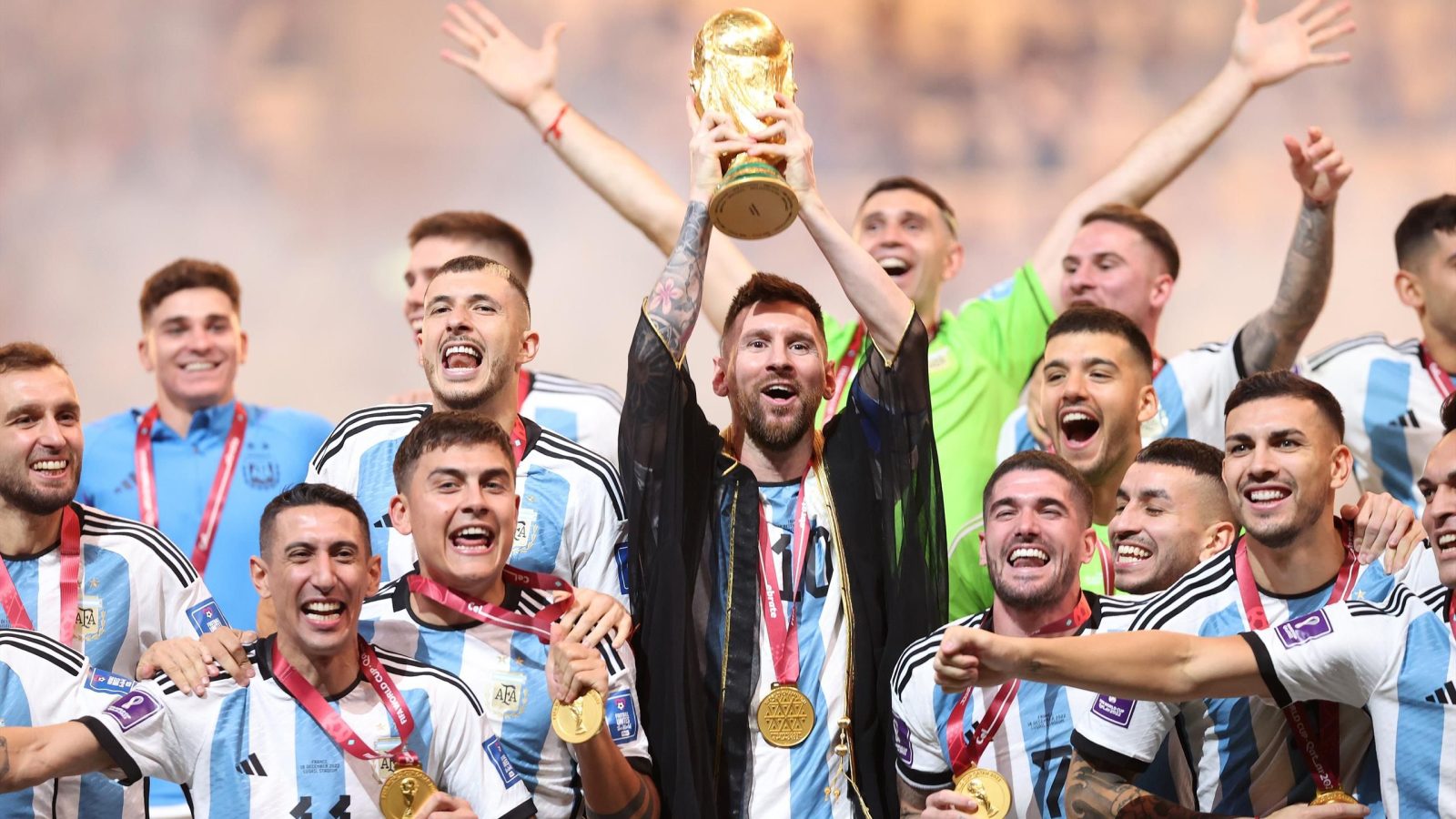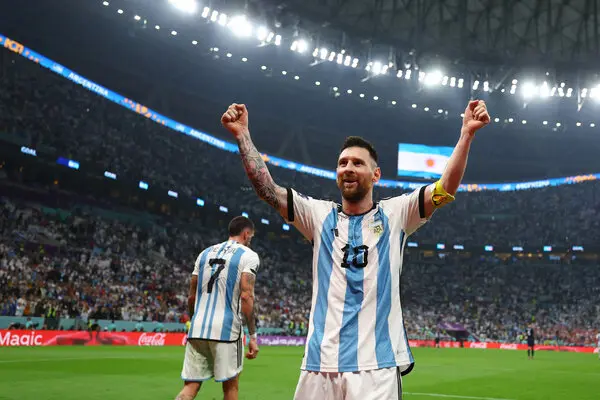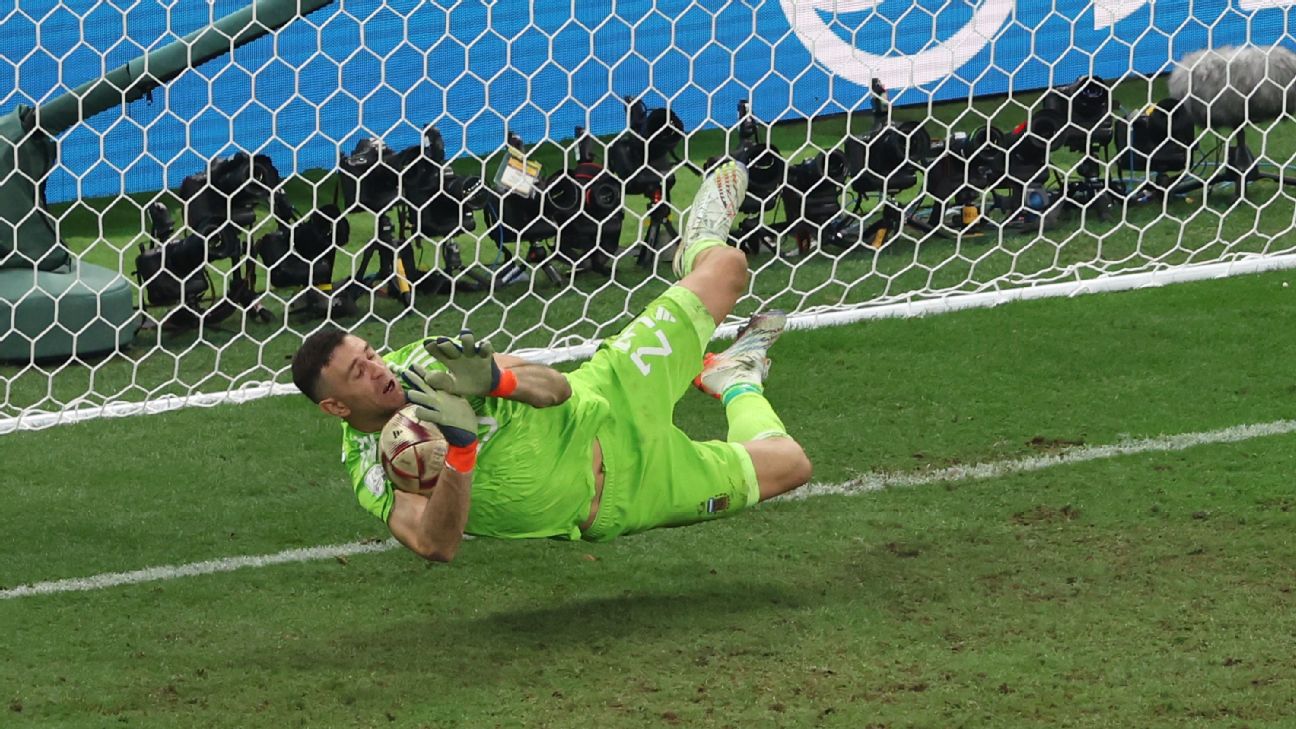As Lionel Messi guides Argentina to World Cup 2022 victory, the question arises: Is he now the greatest football player of all time?

At Lusail Stadium, under the sole spotlight, Lionel Messi claimed the one trophy that had eluded him throughout his glittering career.
A blast of flashlights and special effects accompanied the moment when the 35-year-old Argentine maestro touched his hands together in victorious preparation for his crowning glory while dressed in the traditional Arab gown known as a bit.
Eventually, Messi got the ball in the back of the net. After what was arguably the most stunning World Cup finale in history, a league for the ages that tore at the feeling and played havoc with the pulse rates, Argentina’s icon had finally reached the pinnacle of his career, and the gap in his sparkling collection had been filled.
He now has the World Cup to go along with his seven Ballon d’Or, four Champions League, one Copa America, ten La Liga, and one Ligue 1 championship with Barcelona and Paris Saint-Germain, respectively.
In this case, it was this particular option. The millions of Messi fans who believe he is the best player of all time will now have this trophy as “Exhibit A” in their defense.
Argentines celebrate as Messi equals Maradona on the World Cup in Qatar podcast.
With this nearly 15-inch solid gold trophy in their hands, many will say Messi is the greatest, and those who disagree will have a harder time making their case.
No one can now deny that Messi did belong in the same pantheon as Pele and the other whose image was in several Argentina posters at Lusail Stadium on Sunday and that these comparisons over generations add a different image to all the arguments.
It was inevitable that Diego Maradona, his iconic pioneer in Argentina’s number ten shirt, would have a compelling argument for why he should be considered the best. His victory in the World Cup 36 years ago in Mexico was always a talking point, as Messi has never won a major trophy. It has been taken out of circulation at this time.

The fact that Messi now has the highest honor the worldwide game can offer makes the argument for his greatness even stronger.
When attempting to recount Messi’s rise to fame, where do you even start? How do you describe the culmination of a tournament in which Lionel Messi’s name will live on in infamy? That is the challenge facing anyone attempting to recount the events leading up to Argentina’s Cup Final victory.
The aftermath of among the most exciting World Cup finals in history
The World Cup Podcast Feed: Messi should have known that this honor would not come easily given his history of FIFA World Cup heartbreak and disappointment dating back to 2006, along with a losing final match to Germany at Rio’s Maracana in 2014.
So much anguish preceded Argentina and Messi’s triumphant third World Cup performance at Lusail Stadium, and that may make the victory taste all the sweeter.
And they did it despite a brilliant performance by France’s Kylian Mbappe, 23, who will soon join Messi as one of the sport’s all-time greats.
For 80 minutes, France didn’t pose much of a threat, giving the impression that they were just waiting for Messi’s coronation. Messi scored the opening goal for Argentina from the penalty kick, making history as the first player to score in the pool stages, the round of 16, the quarter-finals, the semi-finals, and the finals all in the same World Cup.
Messi then set up Angel di Maria for his second, and the game continued on its usual path as Argentine fans began celebrating, before the much-anticipated fight with Mbappe finally began in stunning fashion.
With ten minutes left, Mbappe scored from the penalty kick and followed it up with a brilliant volley. Messi’s “not again” expression was displayed in disbelief on the big screens in every corner of the stadium.
Was the ending truly “breathless,” “staggering,” and “magnificent”?
The image of Messi hoisting the World Cup is now legendary.
Golden Boot goes to Mbappe, Golden Ball to Messi
Coach Lionel Scaloni of Argentina made a brilliant choice by starting the 34-year-old Di Maria, who stifled Jules Kounde, but then appeared to cave to fatal conservatism by replacing him with the workhorse Marcos Acuna with 64 minutes left in the game.
In extra time, Messi scored his second goal to rally Argentina, but Mbappe’s penalty brought France back from the brink of defeat.
Nearing the end of the game, with the World Cup seemingly at Randal Kolo Muani’s feet, Argentina goalkeeper Emiliano Martinez made a foot save, but not before Lautaro Martinez’s header went wide of an open goal.
It’d be an understatement to say the atmosphere during the extra time was electric; some spectators had to tear themselves away from the action because the tension was too much to bear.
Amazingly tense, it ended in penalties, where Argentina prevailed 4-2. It was a painful way to end a game that will be remembered for years to come whenever the World Cup is mentioned.
With his arms raised to the sky and tears streaming down his face, Messi collapsed to his knees in the center circle after Gonzalo Montiel’s game-winning penalty kick and was quickly engulfed by a sea of light blue and white striped kits.
In the middle of the chaotic celebration, he grabbed a microphone and addressed the Argentine faithful.
Messi won the tournament’s Golden Ball for best player for the second time in his career after also doing so in 2014. The award was first presented in 1982.
He has the most goals and assists by any player at a World Cup, with 21 total (13 goals, 8 assists). With the two goals he scores in the World Cup final, he now has 793 for his entire professional career. In the same men’s World Cup, he also set a record by scoring in each and every game.
One fact stood out above the rest on this night: Messi had finally won the World Cup.
He sat on the figure-of-eight stage where he and his team had been awarded the World Cup, satisfied that his collection was now complete. Later, when Argentina won the World Cup and returned to the top of the football world Cup for the very first time since 1986, the stage was packed with the team’s loved ones.
For over an hour, Argentina’s fans remained seated, singing the songs that have served as the campaign’s soundtrack. This was the father of the baby.
It felt like forever since the starting loss to Saudi Arabia. Messi’s great goal against Mexico kicked off Argentina’s World Cup run, and he was unable to be stopped in his pursuit of victory.
Messi was holding aloft the golden trophy. More than 16 years after coming on as a substitute and scoring in a 6-0 victory over Montenegro and Serbia in Germany, his mission was finally complete.
With so many unexpected turns, Messi’s World Cup finale against France read like a page-turning thriller. It was a fitting conclusion to a night in Qatar that will be remembered for all time.
